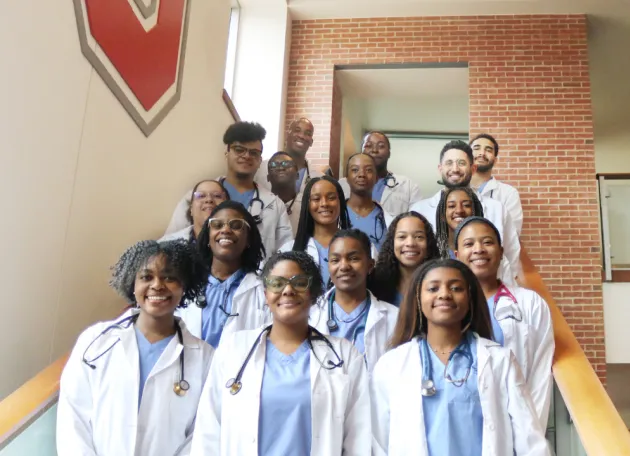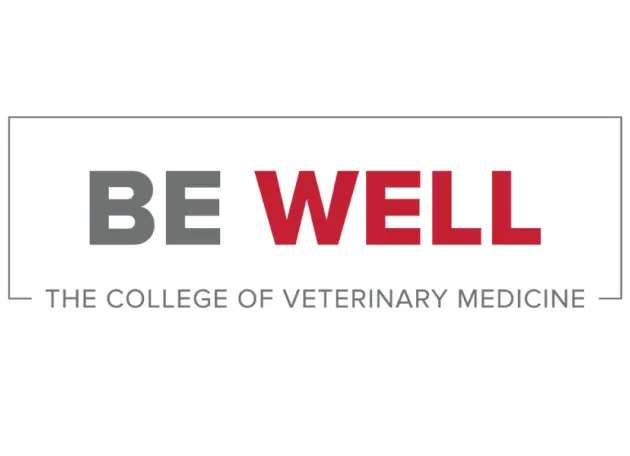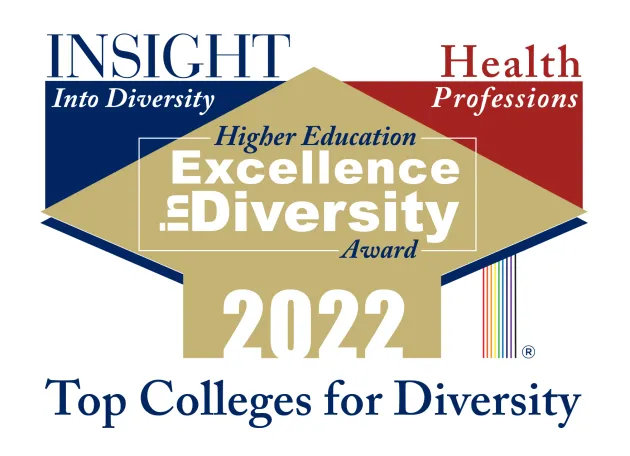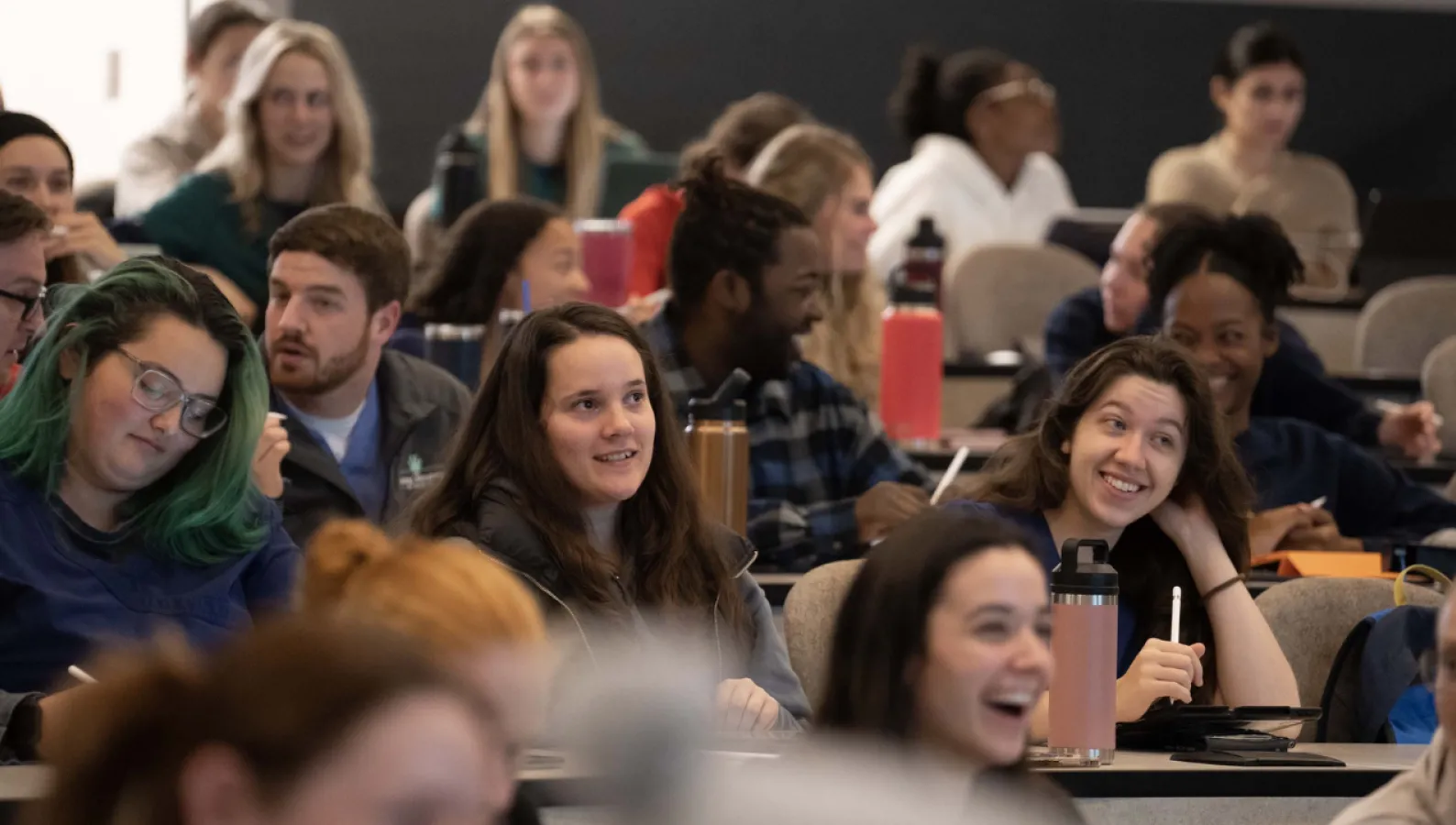Admissions Process and Data
- Bias training has been required for Admissions Committee members, file reviewers, and interviewers since Autumn 2015 (class of 2020).
- Holistic Review, which involves a review of all files before interviews, a separation of file review and interviews, and the development of a file review score, has been in place since Autumn 2015 (class of 2020).
- The GRE requirement was discontinued starting in Autumn 2018 (class of 2023).
|
Class Of |
2018 |
2019 |
2020 |
2021 |
2022 |
2023 |
2024 |
|---|---|---|---|---|---|---|---|
| Race & Ethnicity | |||||||
| # of students | 21 | 23 | 49 | 39 | 57 | 33 | 63 |
| % of class | 13.0% | 14.2% | 30.0% | 24.1% | 35% | 20% | 36% |
| Male | |||||||
| # of students | 30 | 22 | 32 | 44 | 42 | 26 | 40 |
| % of class | 18.5% | 13.5% | 19.7% | 27.1% | 26% | 16% | 23% |
| 1st Generation | |||||||
| # of students | 24 | 46 | 48 | 53 | |||
| % of class | 14.8% | 29% | 29% | 30% |
* Under-represented in the profession, as defined by the Association of American Veterinary Medical Colleges (AAVMC)
Recruitment
Over the past 5 years, the college has provided programming for over 10,000 K-12 and college students. Key recruitment efforts include:
-
Buckeye Vet Prep Academy: a five-day summer camp for high school students to learn about veterinary school and the profession
-
Summer Residential Camp: a five-day program for college students to learn about veterinary school and the profession, run by 2nd and 3rd year veterinary students
-
Vet for a Day and exploration programs for various audiences
-
School visits and career fairs for various audiences
-
Recent focus on increased community events such as Star House, COSI, National Children's Day, and the Columbus "I Know I Can" reading program for second grade classes
Affinity Groups
- The Diversity Committee has established several Community of Inclusion Affinity Groups to foster an inclusive community in the college. These groups are open to all members of the college and provide a network of mentors, allies, and peers, as well as a forum to increase awareness of key issues and advocate for policy and procedural changes.
- The current affinity groups are: (1) First Generation; (2) James H. Bias Affinity Group (for African American students); (3) LatinX; (4) Parenting; (5) Asians in Veterinary Medicine; and (6) WVLDI (Women’s Veterinary Leadership Development Initiative).

Faculty Demographic 2022
In 2022, the faculty consists of 128 individuals (52 in Tenure, 62 in Clinical, 13 in Practice, and 1 in Research)
- Gender breakdown: 59% Female, 42% Male, and no transgender or gender non-binary individuals disclosed
- Gender breakdown by track: 46% Female and 54% Male in Tenure, 65% Female and 34% Male in Clinical, 85% Female and 15% Male in Practice, and 100% Male in Research
- Race/Ethnicity breakdown: 82% White, 1% Black, 10% Asian, 5% Hispanic, and 2% undisclosed
Committees/Councils
Our college has two committees focused on diversity, equity, and inclusion:
- Diversity Committee: Established in July 2016, this committee is comprised of faculty, staff, and student representatives (elected by their class). The Diversity Committee fosters a welcoming and inclusive community within the college by developing strategies and action items.
- Diversity Council: Established in December 2017, this council is made up of members from outside the college (including the university, veterinary profession, and community). The Diversity Council advises the Dean and provides external perspectives and best practices.
Community of Inclusion Certificate Program
This program, developed by the Diversity Committee, allows members of our college to demonstrate their commitment to fostering diversity and inclusion within the college, veterinary profession, and communities we serve. Participants can earn up to three levels of certification: Partner, Ambassador, and Champion. Each level focuses on different aspects of inclusion, such as learning about and supporting a diverse community, representing that community, and actively promoting it.
Examples of events and activities include:
- PRIDE and BQIC events
- Buck-Identity Workshops
- Active Bystander training
- Global Fluency programs
- Open Space Dialogue sessions
- RUOK? Buckeye – REACH initiatives
- Social Media campaigns
- Storytelling training
- Safe Zone workshops
- Mental Health and Mindfulness programs
- Wellbeing initiatives
- Panel discussions
- Outreach activities
- Multicultural Center
- Kirwan Institute
- Employee Assistance Program
- TEDx
- Office of Suicide Prevention
- Office of Teaching and Learning
- VOICE
- Affinity Groups
- Habitat for Humanity
Curriculum Enhancement and Related Opportunities
- The Clinical and Professional Skills Center combines audiovisual and lecture capture technology with high and low fidelity models and simulators allowing students to practice skills in a simulated environment before entering the workforce.
- The Frank Stanton Veterinary Spectrum of Care Clinic is a new, stand-alone facility opened Spring 2021 that will be used to train students to provide spectrum of care veterinary services.
- Stanton Summer Externship Program - externs shadow general practice veterinarians in busy, Ohio-based small animal general practices with a broad socioeconomic clientele.
- Supplemental examination privileges and the opportunity for remediation recently approved by the college’s faculty. In addition, the clinical and professional skills assessments include opportunities for supplemental training and practice.
- Objective Structured Clinical Examinations (OSCEs) for direct evaluation of student performance by trained professionals. OSCEs are a short series of clinical stations in which students are observed and rated on their ability to carry out a simulated clinical procedure.
- Professional Development Classes (both in second year)
- Implicit Bias
- Cultural Humility
Health and Well-Being
Be Well is the college’s new comprehensive and integrated health and wellbeing initiative for students, staff, and faculty. In alignment with our Be The Model® strategic plan, and in partnership with Ohio State’s Buckeye Wellness team, the program incorporates evidence-based approaches, outcome assessments, and programming specific to academic and healthcare professionals. Initial core programming includes Health Athlete training, a full-day workshop on healthy lifestyles; MINDSTRONG, a cognitive behavioral theory-based program; wellness programming such as a book club, snack swaps, yoga, tai chi, and mindfulness classes; and development of a house system for students.

Regional/National
The college hosted the 2nd Annual NABV Conference in June 2022.
The college is part of the Iverson Bell Midwest Regional Diversity collaborative planning committee and will be hosting the 2026 Regional Summit. The summits are designed to develop cultural competency and support a diverse and inclusive academic environment for faculty, staff, and students.
Awards
- Health Professions HEED (Higher Education Excellence in Diversity) Award: selected for this award for five consecutive years (2017-2021).
- 2020 Insight Into Diversity Inspiring Affinity Group Award: Dr. J.H. Bias Black Affinity Group

